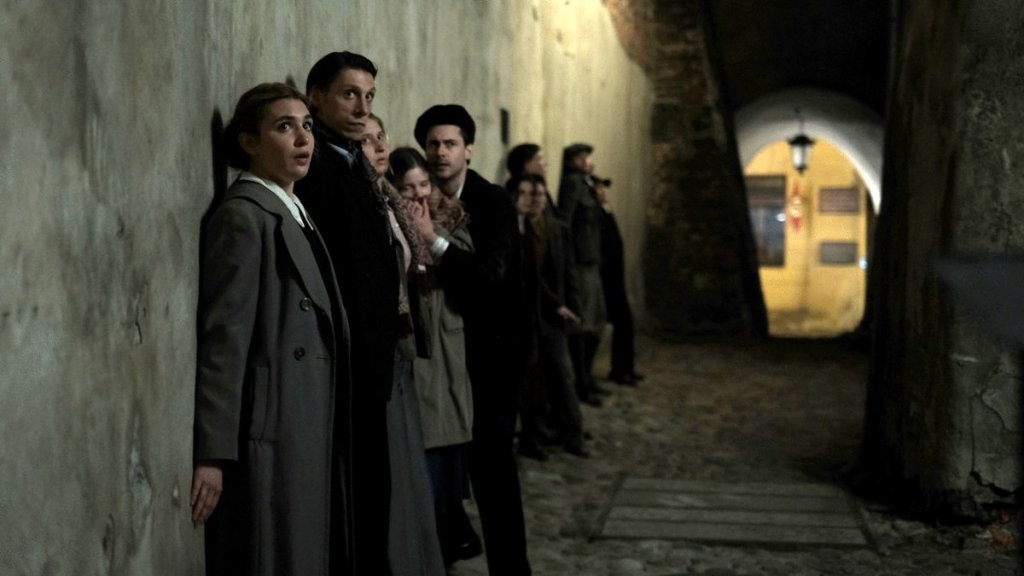
Quiver Distribution/Fathom Events
Irena’s Vow
****
Rating: R
Run Time: 2 hours 1 minute
Stars: Sophie Nélisse, Dougray Scott
Writer: Dan Gordon
Director: Louise Archambault
Reviewed at the Toronto International Film Festival
Brutal and beautiful, Irena’s Vow paints both a stark image of Poland under the bloody boot of Nazi occupation and an inspiring true-life portrait of one brave young woman’s ingenious plan to save a handful of Jews from the death chambers.
Sophie Nélisse (The Book Thief) stars as Irena, a Polish Catholic nurse plucked from the streets of her country town to serve as cook and housekeeper to a posturing German officer named Rugner (Dougray Scott) in the palatial commandeered home of a Jewish businessman.
One of Sophie’s responsibilities is overseeing the work of eleven Jewish workers who work on the estate, tailoring clothing for the German officers and their staff. When the housekeeper overhears plans to murder the workers along with the rest of the town’s Jews, Sophie hatches an only-half-worked-out plan to hide them where no one would look: In Rugner’s basement.
And there they stay for two long years, at times barely eluding detection as suspicions rise not only from Rugner but also from town folk looking for ways to ingratiate themselves with their Nazi occupiers.
It’s this perpetual state of barely-there concealment that sustains the drama in Irena’s Vow. Director Louise Archambault (And the Birds Rained Down) and writer Dan Gordon (Rambo: Last Blood) explore the notion that no one can ever be utterly still and quiet for even short periods, much less two years. There’s always a shuffle, a cough, a sharp intake of breath—incidental actions that, in the course of the film, require the ever-resourceful Irena to formulate excuses and diversions on the fly nearly 24 hours a day.
Much of the power of Irena’s Vow comes in the juxtaposition of lives in the open and in the depths: On Christmas Eve, Rugner throws a dinner party at which the drunken officers belt out the German carol “Oh Tannenbaum” with the gusto of a military anthem—while below, in a candlelit chamber, the hidden Jews softly sing the “Hanukkah Blessing;” thankful for surviving the latest in a people’s millennia-long history of sieges.
Perfect as Irena is Nélisse, whose wide-open face seems to smolder with sadness, even when she allows a reluctant smile. As each new wrinkle challenges Irena’s ever-evolving plan, her eyes dart calculatingly, scanning the room and, perhaps, the universe, for another route of clever escape. Scott—memorable as Arthur Miller in 2011’s My Week With Marilyn—brings an infuriating sense of war-weariness to Rugner. Stoic and conflicted, his Rugner confides to Irena he is “tired of the killing,” going through the motions of occupation and genocide with the sighing detachment of a bank clerk who can’t wait for vacation time to come around.
The Reich, he bitterly tells Irena near the end, “was supposed to last a thousand years. It won’t even last until Easter.”
When the action of Irena’s Vow ventures from the estate, it is often to, almost cruelly, subject us to the obscene violence being perpetrated on the streets of Poland. Just as the Nazis insist the townspeople stand in silent witness to their atrocities, in unsparingly graphic scenes director Archambault likewise forces us to witness the torturous executions of men, women and children.
In the Germans’ minds, the killings are warnings of like punishment for anyone resisting their rule. Archambault has a more benign, if no less urgent, motivation: a reminder that the distance between domestic tranquility and a hell on Earth can be narrow as a line on a map—or the floorboards beneath a pair of spit-polished boots.